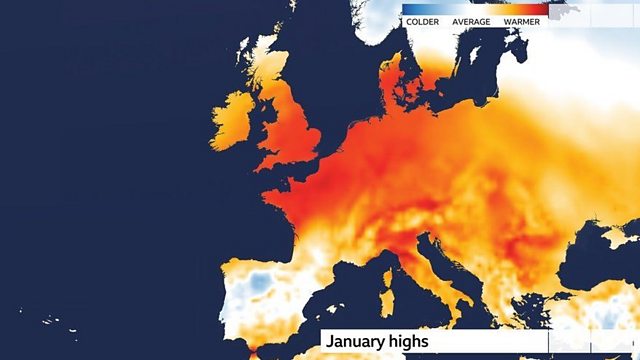What are rising temperatures in Europe doing to food supplies?
Temperatures for January have reached an all-time high in a number of nations across Europe.
Temperatures for January have reached an all-time high in a number of nations across Europe.
Warsaw, Poland, saw 18.9C (66F) on Sunday while Bilbao, Spain, was 25.1C - more than 10C above average.
Temperatures in the Netherlands, Liechtenstein, Lithuania, Latvia, Czech Republic, Poland, Denmark and Belarus also broke national records.
The mild European weather comes as North America faces more severe storms, days after a deadly winter cold snap left more than 60 dead.
Instead of looking at what we can do and why we are not doing enough mitigate climate change, we thought we would examine the impact on agriculture, because that will have an effect on both livelihoods and food consumption.
Newshour's Razia Iqbal has been speaking to Chloe Brimacombe, who is a climate scientist in the UK. She looks at the impact of extreme heat on crops and agriculture in different countries. Will the production of some of the big crops - wheat, rice, and corn - go down as the planet gets warmer?
(Photo shows: January temperatures in Europe compared to normal. Credit: ÃÛÑ¿´«Ã½ Weather)
Duration:
This clip is from
More clips from Newshour
-
![]()
Chilean artist Paz Errazuriz on documenting the Pinochet regime
Duration: 06:55
-
![]()
'I either sleep or walk': World's oldest marathon runner dies
Duration: 04:25
-
![]()
Marina Tabassum on designing the 2025 Serpentine Pavilion
Duration: 06:37






